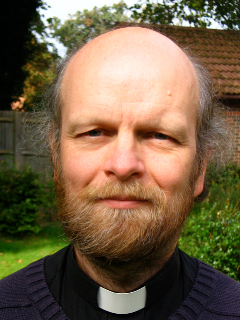Opinion Column

Staying Alert is part of our faith
Regular contributor Andy Bryant is heeding the Government’s advice to Stay Alert, but points out that, as Christians, we should always be alert anyway.
When the Prime Minister changed the government advice from “Stay at Home” to “Stay Alert”, it was much criticised. It did not help that much of the surrounding messaging was often unclear (Who can I meet socially?) and the briefing papers incomplete (exactly how are children to return to school safely?). After the clarity of the original message it all felt rather vague.
Political opponents sought to exploit this seeming lack of clarity. Although they sought the moral high ground of maintaining the clarity of the original message, and therefore prioritising protecting their populations, they were of course also playing to other political agendas.
In Wales they were keen to show how a Labour-led administration would do it differently from the Tory Westminster parliament. In Scotland, the agenda is the aspiration to be an independent country and so going its own way. Whether staying at home or staying alert we are sadly less good at working together as one United Kingdom.
Yet, although much mocked, Stay Alert is a good, if uncomfortable, message. Stay at Home is a simple, clear message. It tells us exactly what to do, and it has been remarkable how willing the British public has been to do what they have been told. The government has become the good parent; we just have to do what we are told, and all will be well.
But Stay Alert begins to shift the responsibility from government on to us. We suddenly have to take responsibility for our own well-being; it is a more adult to adult message. Despite weeks of speculation about the lifting of lockdown, it highlighted that, lulled by weeks of staying at home, many were not ready to suddenly be given responsibility back for their own lives. Rather surprisingly, it seemed we wanted to keep the Nanny State.
And the reality is that as we move out of lockdown the clarity is gone, we are in more uncertain territory. Suddenly it seems riskier – how safe am I if I go out there? In the cocoon of lockdown, we have forgotten that all living is risky. Lockdown could only ever be a temporary solution. At some point we would have to learn to live with this virus just as we have learnt to live with other diseases and infections. Once you leave the nest then the only way to stay safe is to stay alert. Every other animal species has learnt that lesson.
Stay Alert is a long-standing safety message. We are told to be alert to potential computer scams. When driving we need to stay alert, not be distracted by mobile phones or by driving too long and getting sleepy. In industry workers are reminded to stay alert to avoid potential accidents. And in our hospitals and care homes, the only way the staff can continue to help, care, and heal, when surrounded by so much risk, is by staying alert.
Stay Alert is also a key message throughout the New Testament. Jesus says the lesson of the fig tree is that we stay alert, (Luke 21.36). The parable of the wise and foolish virgins reminds us to be alert, (Matthew 25.13). In watching for the signs of the end time Jesus urges his listeners to stay alert, (Mark 13.33). In the Garden of Gethsemane, the disciples are urged to stay alert, (Mark 14.4) – instead, they fall asleep, leaving Jesus to face his final spiritual struggle alone.
St Paul picks up the same theme in his letters. It is an often-repeated instruction in his concluding instructions to his readers. It is linked to standing firm in their faith, being courageous and strong, (1 Cor 16.13); with being constant in prayer and persevering, (Ephesians 6.18 & Colossians 4.2); and with staying awake and not becoming drunk, (1 Thess 5.6).
And it is there in the reading at the Church’s Night Office, Compline, as we are reminded that our adversary the devil is prowling around, (1 Peter 5.8). Each night before we sleep, we are reminded of this vital message. How will we protect ourselves? By being alert.
Being alert is part of being a people of faith. We are to be alert to the presence of God in the world; alert to where we can be of service, alert to the moments when we can speak about the things of God. We are to be alert to where God is already active in the world and learn to join in. We are warned against becoming sleepy and forgetful. The Old Testament story of the People of God is the story of a people who grew forgetful, who forgot all that God had done for them. It is a story of what happens when a people fail to stay alert.
Staying alert is an uncomfortable message for it disturbs us, it calls us to play our part. It says that in life we cannot have perfect protection. It reminds us that in everything we do there is risk. If we want to live again, we cannot hide away for ever.
We must, together, navigate a way through living with this new infection. To do so successfully will require each of us to play our part. It requires us to say alert, to see where the risks are, and so to learn how to mitigate them, and not place others, or ourselves, in undue danger. We cannot just expect others to protect us, we too need to be alert.
For the Christian this is no new message. Being alert should be the hallmark of our encounter with this life and in our preparation for the next. Although we trust in the One, who is the one certainty of our lives, in this world we live with uncertainty for not even the angels know the day or the hour, (Matthew 24.36). And, until then, we are to be alert and about the Lord’s work, daring to believe we can help bring the Kingdom of God on earth.
Image by Syaibatul Hamdi from Pixabay.com
 The Revd Andrew Bryant is the Canon for Mission and Pastoral Care at Norwich Cathedral. He was previously Team Rector of Portishead, Bristol, in the Diocese of Bath and Wells, and has served in parishes in the Guildford and Lichfield Dioceses, as well as working for twelve years with Kaleidoscope Theatre, a charity promoting integration through theatre for young adults with Down’s Syndrome.
The Revd Andrew Bryant is the Canon for Mission and Pastoral Care at Norwich Cathedral. He was previously Team Rector of Portishead, Bristol, in the Diocese of Bath and Wells, and has served in parishes in the Guildford and Lichfield Dioceses, as well as working for twelve years with Kaleidoscope Theatre, a charity promoting integration through theatre for young adults with Down’s Syndrome.
You can read Andrew's latest blog entry here and can follow him via his Twitter account @AndyBry3.
The views carried here are those of the author, not of Network Norwich and Norfolk, and are intended to stimulate constructive debate between website users.